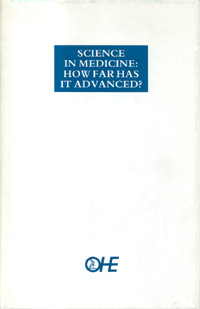Unlocking the Value of Combination Therapies

The chapters in this book are based on contributions to a seminar organised jointly by the Office of Health Economics and the International Science Policy Foundation, and held at the Royal Society of Medicine in London on 10 December 1992. An account of…
The chapters in this book are based on contributions to a seminar organised jointly by the Office of Health Economics and the International Science Policy Foundation, and held at the Royal Society of Medicine in London on 10 December 1992. An account of the discussion which followed each paper is also included. Background notes were circulated to the participants in advance of the meeting and this introduction is largely based on those notes.
The chapters in this book examine these two aspects of science in medicine, starting with a historical perspective, and then taking three examples — infection: nervous diseases: and psychiatry — to illustrate the advances of science in medicine in the twentieth century. The examples have been chosen to illustrate different degrees of penetration of the scientific method in different fields of medicine. Finally, the roles of molecular biology and social science are considered. The objective is to assess how far science has already influenced the practice of medicine and its teaching, and to consider how scientific methods could be more fully exploited in the practice of medicine to make it more ‘effective and efficient’ (in Cochrane ’s classic words). Each of the authors’ contributions, together with the discussion which followed their presentation, clearly illustrates the way in which science has indeed contributed to modern medicine. There is also invaluable discussion of how the contribution of science could be developed in the years ahead. In so far as the book signposts the way forward, it is a fitting tribute to all those such as Archie Cochrane who have done so much to make medicine a twentieth century science.
Science in Medicine: How Far Has It Advanced?
Teeling Smith, G. and Roberts, C. ed.
(1993) Science in Medicine: How Far Has It Advanced?. OHE Monograph. Available from https://www.ohe.org/publications/science-medicine-how-far-has-it-advanced/